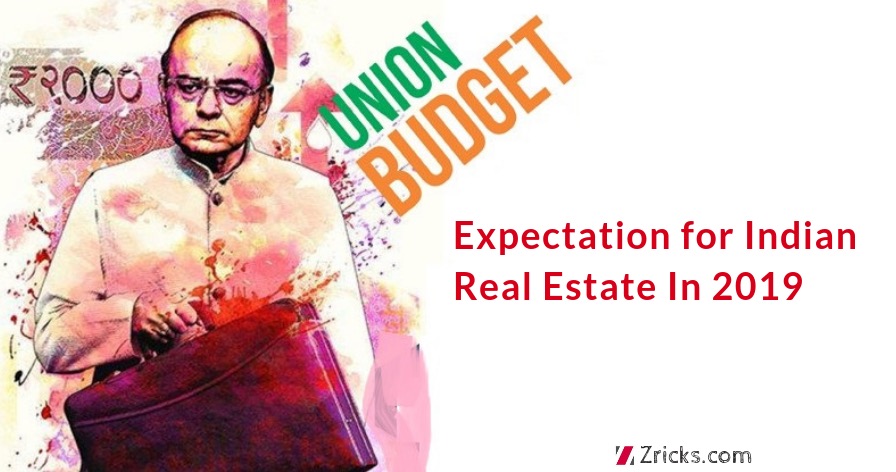Union Budget Expectation for Indian Real Estate in 2019
Share Union Budget Expectation for Indian Real Estate in 2019
For the upcoming Union Budget 2019, the Indian real estate sector will be looking forward to measures that will increase demand, lower costs for developers and bolster momentum moving forward. The past two years have seen numerous policy changes that have significantly impacted the real estate sector including RERA, GST and affordable housing. These reforms have changed the core of how the sector conducts its business. While these changes have invariably caused short-term challenges, the real estate sector expects more stability and growth over the long term, especially with the Government’s support.
Expectations for Union Budget 2019 include initiatives that will revive the market and consolidate the reforms of the previous year. Some of the desired initiatives are Infrastructure Status, Single Window clearances for all approvals, reduction of GST rate and lower income tax burden on home loans.
Infrastructure Status
Union Budget 2017 saw the affordable housing segment being granted infrastructure status. This year, it is expected that infrastructure status will be granted to the entire sector. The growth of the real estate sector in India has a multiplier effect on the growth of the entire economy. The real estate sector supports numerous ancillary industries and provides employment to millions, both directly and indirectly. Union Budget 2019 should reflect the far-reaching magnitude of the real estate sector and grant infrastructure status. This will lead to financing being available to the developer at lower interest rates. In turn, this would make projects more affordable for the home buyer.
Single Window Clearance for Approvals
Real estate is inherently a high-risk sector due to the length of time for project completion and uncertainty regarding project approvals. Approvals can take up to a year or more, which cause project delays and directly impact the rate of return. This is further compounded with the high cost of capital.
With the implementation of RERA, the resulting transparency has forced developers and approval authorities to maintain high levels of compliance and efficiency. Union Budget 2019 should further cement this streamlined process and implement Single Window Clearance. This will ensure project approvals to be processed more quickly, resulting in faster time to market and more certainty.
GST Rationalization
Rationalizing GST on under-construction properties has been one of the real estate sector’s foremost requests since the policy was introduced. A reduction in GST for under-construction properties will spur demand for new projects. For developers, the input tax credit will help reduce construction costs, thereby preventing delays and substantially reducing property costs. To increase sales of under-construction properties, we must incentivize the segment. A reduction in GST will be a strong impetus for growth in 2019.
GST also imposes an additional cost burden on developers. Currently, real estate comes under the 18% GST bracket with 33% abatement for land purchase. In metros however, land purchase can be more than 50% of the project cost. The government should recognize this disparity and accordingly increase the abatement for land to 50%.
Affordable Housing
Affordable housing is the most incentivised segment for both developers and buyers, especially with the granting of infrastructure status. This concept is gaining traction across India with many developers launching affordable housing projects. The majority of the affordable housing projects under the “Housing For All By 2022” programme are to be constructed for low income groups. As this is a highly cost-sensitive segment with low property values, the slightest tax burden can be counter-productive. Lowering GST for only affordable housing projects to 12% with 50% abatement for land purchase will bring the effective GST rate to 6%. This will truly encourage housing for all.
Income Tax Deductions
Expanding the availability of income tax deductions for home buyers can incentivise new buyers and widen the market opportunity. The deduction applicable on interest paid for home loans can be increased for self-occupied houses. Additional income tax deductions can be offered to those who are buying properties within the affordable housing segment. This will provide crucial support to this segment as affordability is a substantial constraint on demand. The sector will also benefit from revised income tax slabs that reduce overall tax expenditure. This will enhance the ability of the salaried class to invest in real estate.
Real Estate Investment Trusts
India is one of the fastest growing economies over the past two decades. This growth is being led by the services sector, which drives the demand for office space. REITs would continue to improve this trend. REITs have the potential to enhance the supply of commercial real estate, which provides the foundation for a thriving employment ecosystem. This invariably leads to a thriving residential real estate market. To make REITs more attractive to investors, the long-term capital gains holding period for REIT units should be reduced to 1 year, which is at par with equity investments.
Request a Call Back

